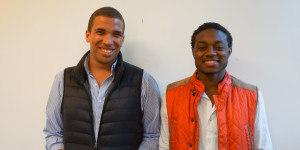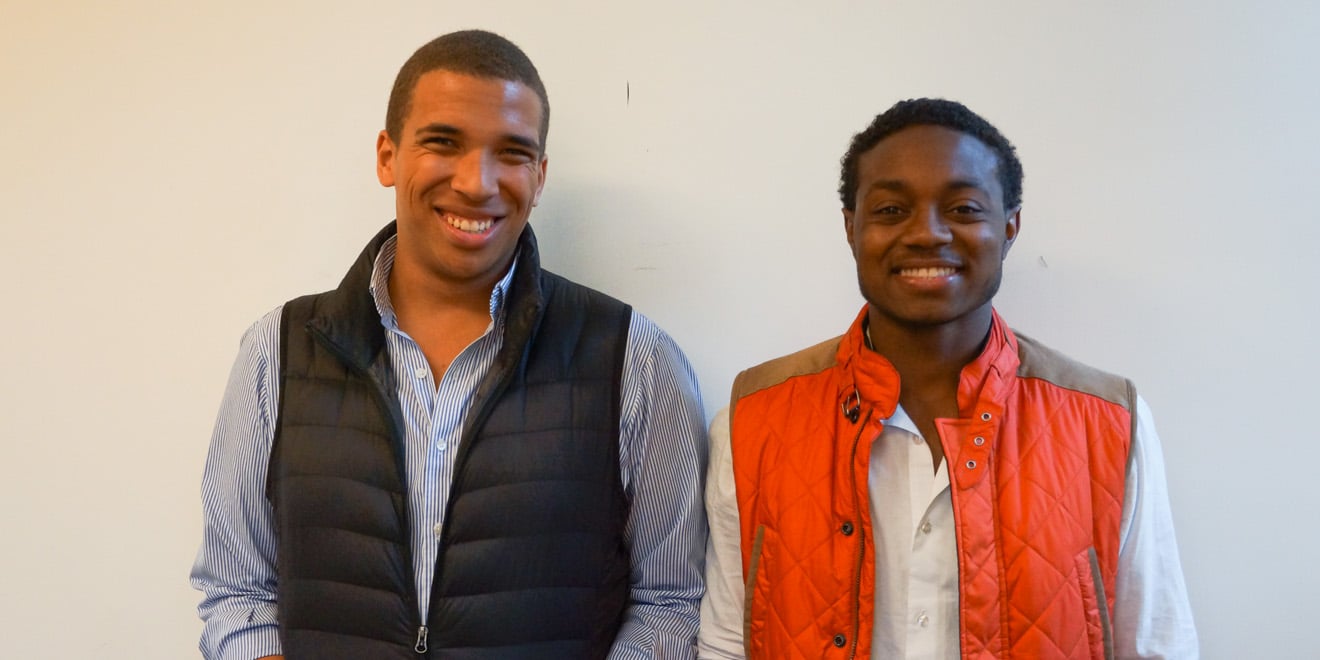
John-Lancaster Finley ’16 and Brandon Hill ’16 are hoping to follow in the steps of their Black Recruitment and Orientation Committee “Big Sib” Logan Richard ’15 by serving as ASSU Executive next year. Both are political science majors, who are also double majoring in urban studies and African American studies, respectively. Their collective previous experience on the ASSU motivated their decision to run. Their slate mainly focuses on addressing mental health, creating a more vibrant social scene and making sure that the ASSU is run legitimately and effectively, particularly in regards to funding reform.
The Daily sat down with Hill and Finley to discuss their lives at Stanford and their memorable experiences.
The Stanford Daily (TSD): Where did you guys live freshman year?
John-Lancaster Finley (JLF): I was in Ujamaa my freshman year.
Brandon Hill (BH): He’s very proud about that.
JLF: He’s [Hill’s] actually never lived in Ujamaa despite where he spends all of his time.
BH: They say I’m C-wing.
JLF: There are two halls in Ujamaa. There’s A and there’s B, and then the people who have never lived in Uj but hang out there all of the time are C-wingers, and so Brandon Hill has been a lifelong C-winger.
BH: Freshman year, I lived in Soto in Wilbur.
TSD: Can you talk about some of your experiences abroad?
BH: Sometimes, I just do things that are wild, like in one such experience in South Africa. I only tell this story because people think it’s funny. I don’t think it’s funny.
There’s this table mountain — people hike up it, people climb it, people run up it. To get to the peak is like a three- or four-hour hike. I had a plan to go with a group of Stanford students at 7 a.m. That morning, I actually happened to sleep in late. I got dressed as the taxi was pulling out to go. A normal human being would have been like, “My party left.” I was like, “I’m going to go on an adventure and track them down, climb up the mountain and catch up to them halfway up.”
I threw on my gear and took a taxi to the trail and had it all on a clock. I sprinted up the mountain. I made it to the top and then realized I had taken a wrong turn and went back down the mountain. Every moment was an adventure, and you got to improvise. South Africa — you kind of made it your own, and that story right there summarizes how I took on my year abroad.
TSD: What are some things you’ve struggled with while on campus?
JLF: For me, there’s a whole lot. Freshman year was a lot for me. I got here and trying to figure out who I was was a big struggle. For me, growing up, both of my parents are African-American. I’ve always been a little bit lighter, so there was a big struggle of finding out my racial identity. People would tell me, “You’re the token black kid,” or they would tell me I’m basically white.
I got to Stanford living in Ujamaa, where I was fully immersed residentially, culturally, academically, intellectually in the African-American diaspora — in the black experience in America and at Stanford. That I could celebrate, be loved and exist — and Ujamaa felt like that, and I think I decided to push myself further and explore things, and that whole process was stressful.
On CAPS and on-campus resources
JLF: I lost eight people who were close to me during my freshman year. I was Frosh Council president and trying to figure out my major and taking all of these classes, and things felt like they were falling apart. I went to CAPS and had the worst possible experience at CAPS.
I had to explain my situation over the phone, and I hated that experience. I had to go in and wait for an hour in the waiting room where I was waiting for a counselor to be available. I started talking to them about things that were bothering me… The counselor seemed entirely unprepared to be dealing with [what I had to say].
My RF redirected me to my resident dean. This is where I felt the black community was very helpful for me, because the community was there for me.
Black Lives Matter movement
JLF: And then this year, with everything that went on with Black Lives Matter, when Ferguson happened, when Michael Brown was shot, when Tamir Rice was shot — in the black community, we felt the pain every single time. For me, struggling to figure out where I had a black life at all, about where it mattered … that’s why I was at the Black Lives Matter protest.
If you are trying to figure out who you are and how you fit into the country, and the country is telling you “You don’t matter,” that is such a battle. This year especially, it’s been dominating people’s minds. It’s been dominating my mind.
BH: For me, I got into Stanford early acceptance… I went from that on acceptance day all the way through graduation nine months later. I gave my graduation speech, and then a couple of days later, I got this letter from Stanford that said I had been unaccepted from Stanford University.
What had happened is that I got a couple of D+’s during spring semester senior year, so they rescinded me, and they said, “You have to take a gap year and retake the classes you failed.” So for me, that sent me into a huge state of depression. I’m supposed to be Class of 2015. I ended up having an amazing gap year full of travels, but the question [that] has been ringing in my ear, especially freshman and sophomore year, is “Am I supposed to be at Stanford? Am I good enough?” I constantly have to prove myself.
I came into Stanford with that sense of always having to prove myself – that I’m worthy. Actually, what helped me is that other students feel that way just as well. Was my acceptance a mistake? Talking with other people has helped me realize that we are here for a reason.
This interview has been condensed and edited.
Contact Alexis Garduno at agarduno ‘at’ stanford.edu.
